Let’s be honest: the line between history and fiction doesn’t really exist. After all, history is just stories we tell ourselves. The way we tell those stories says more about our time than about the times we’re examining. Reading about decades- or even centuries-old events in contemporary sources and then comparing how we talk—or don’t talk—about them now is a sobering insight into how writing history shifts what happened into what we think happened and how we process it long after the fact.
So when we write fantasy using history as our playground, we aren’t really rewriting history. We’re writing our own questions played out on a historical background. Fortunately for us, history is cyclical, and we keep needing the same questions answered again and again and again.
The very best books use those legends and histories so seamlessly that, after reading, you feel like you know true things. And even if much of the history you are then driven to research turns out to be made up, that sense of truth captured by the writer doesn’t fade.
With that in mind, here are my five favorite books that use European history or historical legends as a background for asking timeless questions about life, love, and the reality of magic.
The Once and Future King by T. H. White
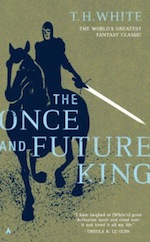 As the basis for this brilliant novel, White uses the legends of King Arthur and Camelot. What could have been merely a retelling becomes something so much larger as he uses those tales to explore kingdoms, wars, politics, love, loyalty, and the transient, unobtainable notion of goodness. As we follow Arthur from child to man to king, we grow with him and carry the weight of all that knowledge and all those choices, too. Though not the original, White’s Camelot (not a silly place at all) feels far truer than any other version.
As the basis for this brilliant novel, White uses the legends of King Arthur and Camelot. What could have been merely a retelling becomes something so much larger as he uses those tales to explore kingdoms, wars, politics, love, loyalty, and the transient, unobtainable notion of goodness. As we follow Arthur from child to man to king, we grow with him and carry the weight of all that knowledge and all those choices, too. Though not the original, White’s Camelot (not a silly place at all) feels far truer than any other version.
The Raven Cycle by Maggie Stiefvater
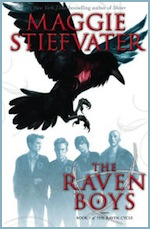 There was once a Welsh prince named Owain Glyndŵr. That much is true. Maggie Stiefvater is one of the greatest current YA writers. That much is also true. The rest—five friends, practical psychics, ley lines, dreams and nightmares coming to life, true love that is literally deadly, wealthy connoisseurs of wonder, and really awful cars described in loving detail—uses the myth of Glyndŵr waiting to be called back to tell a fantastic-but-true-feeling story of what it is to long for magic in a world that constantly tries to deny you. Stiefvater’s books will give you a little bit of that magic back.
There was once a Welsh prince named Owain Glyndŵr. That much is true. Maggie Stiefvater is one of the greatest current YA writers. That much is also true. The rest—five friends, practical psychics, ley lines, dreams and nightmares coming to life, true love that is literally deadly, wealthy connoisseurs of wonder, and really awful cars described in loving detail—uses the myth of Glyndŵr waiting to be called back to tell a fantastic-but-true-feeling story of what it is to long for magic in a world that constantly tries to deny you. Stiefvater’s books will give you a little bit of that magic back.
His Fair Assassin series by Robin LaFevers
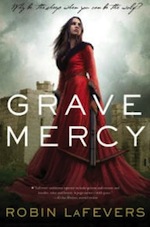 I’ll say it up-front: There wasn’t a secret island convent of assassin nuns (the bastard children of the God of Death) that got swept up in political intrigue in Medieval Brittany. More’s the pity, because assassin nuns. But LaFevers works her subtle fantasy elements so seamlessly into the tapestry of a real-life historical border war you can’t quite give up the hope that maybe—just maybe—LaFevers knows some things we don’t.
I’ll say it up-front: There wasn’t a secret island convent of assassin nuns (the bastard children of the God of Death) that got swept up in political intrigue in Medieval Brittany. More’s the pity, because assassin nuns. But LaFevers works her subtle fantasy elements so seamlessly into the tapestry of a real-life historical border war you can’t quite give up the hope that maybe—just maybe—LaFevers knows some things we don’t.
Jonathan Strange & Mr. Norrell by Susanna Clarke
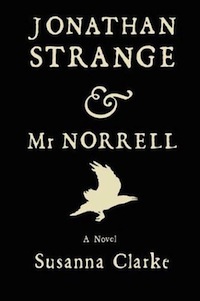 This massive tome is as charming as it is wordy. It’s hard to believe it wasn’t written during the Napoleonic Wars; Clarke’s imitation of the style of the time is a master class in voice. Her footnotes, referencing legends and histories that didn’t actually occur, are one of the highlights of a highlight-packed book. But her reimagining of an England that had actual magic in its past—and future—feels so plausible because of how much is rooted in the actual regional myths and legends of the British Isles. Stories have it that, back in the day, if you suspected your house was on a fairy path, you moved. That same sense of wonder and dread at the mysteries of magic permeates this one-of-a-kind, deeply British book.
This massive tome is as charming as it is wordy. It’s hard to believe it wasn’t written during the Napoleonic Wars; Clarke’s imitation of the style of the time is a master class in voice. Her footnotes, referencing legends and histories that didn’t actually occur, are one of the highlights of a highlight-packed book. But her reimagining of an England that had actual magic in its past—and future—feels so plausible because of how much is rooted in the actual regional myths and legends of the British Isles. Stories have it that, back in the day, if you suspected your house was on a fairy path, you moved. That same sense of wonder and dread at the mysteries of magic permeates this one-of-a-kind, deeply British book.
Outlander by Diana Gabaldon
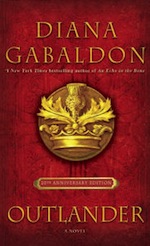 Come for the time travel, stay for the kilts. Gabaldon’s book is famously hard to categorize—is it fantasy? Sci-fi? Historical romance with a slightly magical twist? In the end, it doesn’t matter what it is, because what it isn’t is boring. Ever. Taking a plucky World War II nurse and throwing her back in time to Scotland during the Jacobite rebellion lets the reader discover this time and history right along with the intrepid heroine. (And if it, ahem, has rather more sexytimes than most history texts, well! As I said, the past isn’t dull in Gabaldon’s hands.) I’m guessing that, like me, most readers start out not knowing much about this period in Scottish history, and come away feeling like they lived it.
Come for the time travel, stay for the kilts. Gabaldon’s book is famously hard to categorize—is it fantasy? Sci-fi? Historical romance with a slightly magical twist? In the end, it doesn’t matter what it is, because what it isn’t is boring. Ever. Taking a plucky World War II nurse and throwing her back in time to Scotland during the Jacobite rebellion lets the reader discover this time and history right along with the intrepid heroine. (And if it, ahem, has rather more sexytimes than most history texts, well! As I said, the past isn’t dull in Gabaldon’s hands.) I’m guessing that, like me, most readers start out not knowing much about this period in Scottish history, and come away feeling like they lived it.
Originally published in May 2016.
 Kiersten White is the New York Times bestselling author of the historical reimagining And I Darken, starring a gender-swapped Vlad the Impaler. Among her previous works are the Paranormalcy trilogy, the Mind Games series, Illusions of Fate, and In the Shadows with artist Jim Di Bartolo. Follow her on Twitter at @kierstenwhite.
Kiersten White is the New York Times bestselling author of the historical reimagining And I Darken, starring a gender-swapped Vlad the Impaler. Among her previous works are the Paranormalcy trilogy, the Mind Games series, Illusions of Fate, and In the Shadows with artist Jim Di Bartolo. Follow her on Twitter at @kierstenwhite.










I would like to suggest the “King Raven Trilogy”, by Stephen R. Lawhead, which reconfigures the Robin Hood myth to take place during the Norman conquest of Great Britain, and posits “Robin” (renamed named “Bran ap Brychan”) as heir to a small Welsh kingdom that is taken over during the Norman invasion, then adds in a bit of woodsy mysticism to add to the flavour, to top it all off.
I want to add Bernard Cornwall’s Saxon Chronicles and his retelling of King Arthur. Not fantasy, but fantastic.
I would like to suggest Jack Whytes Camulod Chronicles. Not so much what you would call “real” magic. But the stories are told so well, you can’t tell history from fantasy from practical magic. I’m not even sure if it’s suppose to be magic or slight of hand. But very well written and entertaining.
I’d propose to add Neal Stephenson’s Baroque Cycle, it’s massive, sprawling and beautiful and it mixes history and fantasy in such a way you never know what really happened or what didn’t, but even though largely fictitious, I do feel I understand the baroque era much better after reading this trilogy!
@1
I’ve read very little Robin Hood. How does what you describe differ from Robin Hood as normally portrayed? I’m curious because it sounds like something i might enjoy reading.
Practically everything Guy Gavriel Kay ever wrote.
@6 – absolutely.
Bujold’s Curse of Chalion takes inspiration from 15th century Iberia but with demons and miracles.
David Drake’s Cross the Stars and The Voyage. His Northworld trilogy as well. Are there any more science fiction or fantasy novels out there that do this?
I’ve read very little Robin Hood. How does what you describe differ from Robin Hood as normally portrayed?
It’s customary now to have the Robin Hood stories taking place in the 13th century, during the reigns of King Richard I Lionheart and King John Lackland. Interestingly, though, TH White does the same thing, having Robin Wood be a Saxon outlaw around the time of the conquest.
Gillian Bradshaw’s The Wolf Hunt, set in the court of Duke Hoel of Brittany and based on Mare de France’s retelling of the werewolf legend, “Bisclavret.”
And Marie Brennan’s “Onyx Court” series, London history with fairies in it.
The Once and Future King is not merely brilliant, but oh so beautifully written…
Are we only talking British based historical legends? Because if not, Katherine Arden’s Winternight trilogy writes of an obscure period (to me) in Russian history, 14th century Moscow in the time of Ivan II and his son Dmitri where saints and warriors made legends of themselves, but does it from the point of view of a young woman who influences the world around her with her magic. And before you roll your eyes, this is no YA princess fantasy. These are books with a solid historical base that drove me into Wiki, then any non-fiction I could find about the period, which was sadly very little.
@5 Robin Hood is often portrayed as Saxon, and as such comes with certain expectations and cultural qualities, feeling more like a tale from the realm of a latter-day King Arthur than a more mythic and wild thing. In The King Raven Trilogy, the Caeldish setting gives a very different tone and vibe, feeling much less proper and more mythically raw, with a tone like, say, Scott Lynch’s The Lies of Locke Lamora. In addition, as @10 pointed out, it’s set in a very different time with a different threat looming overhead. Also, the Marion analogue is probably the smartest character in the series, and is not relegated to just “maiden” status. And while the basic structure of the characters/story is the same, how it goes about using said structure is very different and much more dynamic and true to the characters/setting, in my opinion.
Unrelatedly, another book I would suggest is Connie Willis’s The Doomsday Book, which goes into the Black Plague of the 1330s, and compares it to how our modern day sciences and precautions may still not be able to do much to help an epidemic of that scale. It balances gravity and humour very nicely.
Harry Harrison & John Holm wrote The Hammer and the Cross set in the 9th Century around Viking Invasions.
It’s been years since I last read this book, but as Wikipedia puts it:
I think that we can go both more recently than the 13th Century and farther back.
The Hornblower books expand on the legendary (and true!) exploits of Lord Cochrane during the Napoleonic Wars.
And where does the genre of historical fiction fall in this, like Graves, with I, Claudius and Claudius the God, or Ellis Peters’ (pen name of Edith Pargeter) Cadfael mysteries? A lot of pre-printing press history is based on unreliable sources, so it’s a small leap from “historical fact” to “legendary.”
Harry Turtledove’s books set during an alternate history of WWII.
Larry Correia’s Grimnoir Chronicles are set during the depression and just before WWII.
Here’s a list I found on Wikipedia: https://en.wikipedia.org/wiki/List_of_alternate_history_fiction
@17,
Is this exploring alternate history? If so, Lord knows that there’s a lot of that.
Exploring legends, whether fact-based, like those based on Cochrane, or fiction-based, like “lost cause” narratives, is certainly legitimate, but restricting this to legends which seem to have come out of very old oral histories does, pretty much, eliminate just about everything post-Gutenberg, at least for European legends.
Going back:
I’d include Dan SImmons, Olympos/Ilium pair. There’s also a book by L Sprague de Camp where one of the characters has to walk back to Greece from someplace like current Namibia, obviously inspired by Odysseus.
There’s also To Say Nothing of the Dog, by Connie Willis, which is a satire, with time travel and chaos theory (as well as other things), that takes place around Victorian-era Oxford and such, for most of the time.
I saw a Welsh mythology mention but I am surprised by the lack of Lloyd Alexander’s The Chronicles of Prydain, which takes most of its inspiration from the Welsh epic poem Mabinogion.
I also thought of Tim Powers’ historical fantasy novels but then I remembered they don’t count as they are not inspired by historical legends and myths but by real history embroidered into magical alternate history.